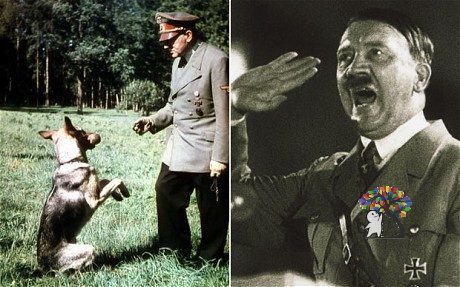Why Terrible People Can Still Love Animals

Affection for animals is a trait most of us associate with good people. The logic is sound: the tolerance and sympathy that it takes for someone to have genuine love for different species should be easily transferable to their own species. Unfortunately, as history and psychology show, this is not always true.
In this article I give multiple examples of bad people who were good to animals and list various reasons for their contradictory morality. As you will see, such people are not animalies.
They Value Animals More than Certain Humans
In 1933, some of the era’s most sophisticated animal rights laws were passed by a political party whose mission, among others, was to end the unnecessary suffering of non-human beings. This was the Nazi party, which had just come to power in Germany under the leadership of Adolf Hitler, a vegetarian, conservationist, and a man who, at his poorest, would share his last scraps of food with the mice that lived in his barracks. In 1945, after 11 million people had died under Hitler’s regime in circumstances so cruel that the newly-deceased chancellor became synonymous with evil, many of his animal rights laws were upheld by the post-war allied government. Some, like his ban on hunting with hounds, are still on the books in Germany.
So how does this happen? How does a person, and many members of his party (Hitler’s second in command, Hermann Goering, once sentenced a man to a concentration camp for cutting up a frog for fish bait), come to value animal life and devalue human life, even though humans are animals? It has much to do with autonomy. Jewish people could be blamed for Germany’s problems but not cats or deer or bears, because the latter only do as nature intends. “Nature” was a driving force in the Nazi movement. Hitler considered himself a champion of natural selection since he was accelerating the process in the direction that nature intended – fixing what the “inferior races” screwed up. It never occurred to him, or was ignored, that the same natural determinism that acts on the bear acts on the Jew. Nature’s will is what is, not what its pawns think it should be.
They View Animals as “Innocent”
This hatred of human autonomy seemed to possess Charles Manson. The cult leader reportedly said that he’d rather kill people than animals. Considering that Manson would later be found guilty of nine murders, we have no reason not to believe that statement. Though humans could be killed with impunity in Manson’s philosophy, animals could not. He chastised his followers for shooting rattlesnakes, driving over a tarantula, picking flowers, and once for stepping on a blade of grass. Drawing such a broad line between humans and animals was partly strategic, since it helped rewire his followers’ ethics, but it came from a place of legitimate affection that Manson had had since childhood. Like Hitler, Manson believed that humans were corrupting nature: “Animals shouldn’t be hunted and nature shouldn’t be disturbed, even destroyed, to benefit the whims of mankind.”
Thus, to two of the 20th century’s most depraved participants, animals were innocent. Does this make you uncomfortable? It should, because many of us normal people believe the same thing. One study, which required college students to note their levels of compassion in response to stories about an identical crime that happened to four different victims, an infant baby, a puppy, a six-year-old dog, and a 30-year-old adult, found that the baby, puppy, and dog evoked similar amounts of empathy. The 30-year-old, however, was a distant fourth. The conclusion we must draw from these results is that compassion is at its highest when the recipient is perceived “helpless,” as in unable to take care of itself.
Had they participated in this study, Manson and Hitler’s answers would have likely been the norm.
They Use Animals for their Own Pleasure
It’s clear that terrible people can still have empathy, even if that empathy is very, very selective, but there are terrible people without empathy who can still adore animals. Psychopaths are classified by their absence or lack of empathy, narcissism, and powers of manipulation. For such people who desire complete control and resent the people who are impervious to their methods, what’s a better companion than a dog? Many psychopaths have pets. Serial killer Dennis Nilsen owned a border collie named “Bleep,” which he treated remarkably well. Before being imprisoned for the murders of 12 young men, Nilsen’s principal concern was what would happen to his dog.
Psychologists infer from cases like this that dogs are able to supply psychopaths with the respect and devotion that they can’t get from their peers and family. But we need not reserve this mentality for psychopaths; normal people get pets for the same reason.
Animal affection is not a prerequisite for benevolence. Though there are people who feel unconditional love for all species, some love animals at the expense of humans, like Hitler and Charles Manson, or love animals in a selfish way, like Dennis Nilsen. Don’t automatically assume that an animal person is a good person. A good person doesn’t need to categorize their goodness.



This was very interesting. 😀